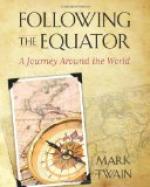He took to the road in the middle of a placid Sunday afternoon in the soft Missourian summer, and he was equipped properly for his mission. He was clothed all in white linen, with a blue ribbon for a necktie, and he had on dressy tight boots. His horse and buggy were the finest that the livery stable could furnish. The lap robe was of white linen, it was new, and it had a hand-worked border that could not be rivaled in that region for beauty and elaboration.
When he was four miles out on the lonely road and was walking his horse over a wooden bridge, his straw hat blew off and fell in the creek, and floated down and lodged against a bar. He did not quite know what to do. He must have the hat, that was manifest; but how was he to get it?
Then he had an idea. The roads were empty, nobody was stirring. Yes, he would risk it. He led the horse to the roadside and set it to cropping the grass; then he undressed and put his clothes in the buggy, petted the horse a moment to secure its compassion and its loyalty, then hurried to the stream. He swam out and soon had the hat. When he got to the top of the bank the horse was gone!
His legs almost gave way under him. The horse was walking leisurely along the road. Brown trotted after it, saying, “Whoa, whoa, there’s a good fellow;” but whenever he got near enough to chance a jump for the buggy, the horse quickened its pace a little and defeated him. And so this went on, the naked man perishing with anxiety, and expecting every moment to see people come in sight. He tagged on and on, imploring the horse, beseeching the horse, till he had left a mile behind him, and was closing up on the Taylor premises; then at last he was successful, and got into the buggy. He flung on his shirt, his necktie, and his coat; then reached for—but he was too late; he sat suddenly down and pulled up the lap-robe, for he saw some one coming out of the gate—a woman; he thought. He wheeled the horse to the left, and struck briskly up the cross-road. It was perfectly straight, and exposed on both sides; but there were woods and a sharp turn three miles ahead, and he was very grateful when he got there. As he passed around the turn he slowed down to a walk, and reached for his tr—— too late again.
He had come upon Mrs. Enderby, Mrs. Glossop, Mrs. Taylor, and Mary. They were on foot, and seemed tired and excited. They came at once to the buggy and shook hands, and all spoke at once, and said eagerly and earnestly, how glad they were that he was come, and how fortunate it was. And Mrs. Enderby said, impressively:
“It looks like an accident, his coming at such a time; but let no one profane it with such a name; he was sent—sent from on high.”
They were all moved, and Mrs. Glossop said in an awed voice:
“Sarah Enderby, you never said a truer word in your life. This is no accident, it is a special Providence. He was sent. He is an angel—an angel as truly as ever angel was—an angel of deliverance. I say angel, Sarah Enderby, and will have no other word. Don’t let any one ever say to me again, that there’s no such thing as special Providences; for if this isn’t one, let them account for it that can.”




